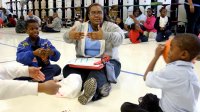How It Works: Social and Emotional Learning After School
South Carolina’s WINGS for Kids uses fun activities and precise language to reinforce social and emotional lessons every day.
WINGS for Kids partners with four elementary schools in the Charleston County School District, all of which serve low-income neighborhoods. The schools provide WINGS with access to all of their facilities after school, student records, and an on-site office, and they allow the organization to keep full control of its programming.
A Game of No-No Tae Bo: WINGS Program Director Will Thompson helps students practice saying no to peer pressure, martial-arts style.
Students are placed by grade level in "nests," or groups of 10 to 12, each with its own teacher. Every day, the program starts with all the school's WINGS students -- clustered in nests -- coming together for a half hour of Community Unity, during which they eat, chat, say the creed, and play games related to the week's objective (and these games are actually fun). One additional staffer, the peace manager, handles serious discipline problems as needed throughout the afternoon.
An important part of the WINGS model is recruiting local college students to serve as teachers, or WINGSLeaders, as they're called. Executive Director Bridget Laird says college students' energy and creativity bolster the program, plus the after-school time slot works with their course schedules, and many of them need part-time work. Laird selects students from all kinds of majors -- biology, communications, business -- and many end up switching to education.
The teachers get 40 hours of summer training plus 20 hours during the year, and they earn $10 to $12 an hour, depending on their number of years at WINGS. A computer-based evaluation system, in which teachers keep detailed logs of their interactions with kids, helps Laird and the four program directors (one per school site) track their performance and maintain quality. Over the course of the year, the leaders stick with the same kids in the same nest and get to know them well.
After Community Unity circles, the children move into Choice Time, two 40-minute-long elective activities that change every nine weeks. The WINGS leaders invent Choice Time classes -- such as basketball, drama, reading club, or science explorers -- according to their own personal interests, and they perform live commercials to recruit kids to choose them.
The week of my visit, children in Willette Holmes's Sweet Shop class are creating monsters out of candy to scare the peer pressure away. The creatures -- with Rice Krispies treat bodies, toothpick arms, and Skittles for eyes -- hold little hand-lettered signs reading "No means no" and "No because it's wrong."
Cairo, a chubby kindergartner, spontaneously hugs me. "What's your favorite part of the day?" I ask. "Community Unity," he answers. And his favorite part of the creed? He says, "I soar with wings!"
The day wraps up with 40 minutes of academic time, including homework help (in separate classrooms, by nest), and a quick final assembly. On Fridays, the children take a quiz on the week's objective -- written quizzes for those in grades 3-6 and one-on-one oral quizzes for the younger grades.
